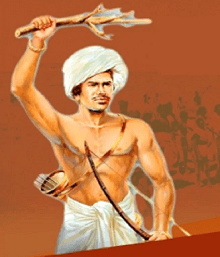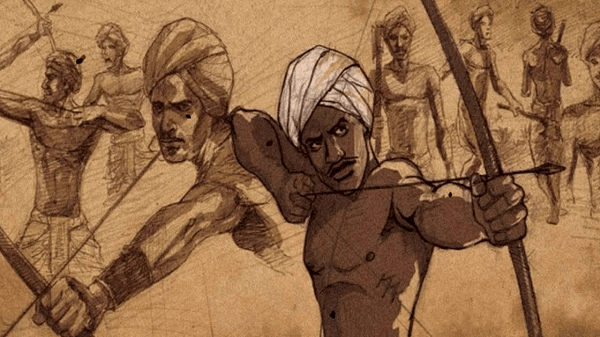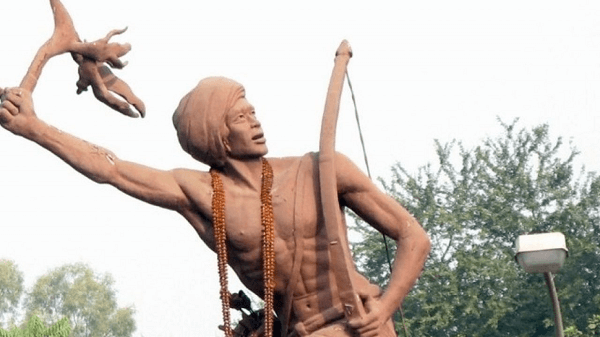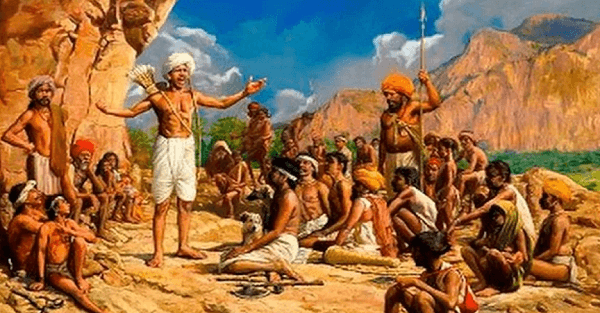Birsa Munda
Birsa Munda was a young tribal leader and freedom fighter. He is recognized for his actions and a powerful statement that he gave in opposition of British authority in India in the late nineteenth century. Birsa Munda's accomplishments are even more impressive because he attained them before age 25. Birsa Munda was born and raised in the tribal region of Bihar and Jharkhand. In the year 2000, on his birth anniversary, Jharkhand was established as a state in honor of his influence on the nationalist movement. Birsa, born November 15, 1875, spent much of his youth traveling from village to village with his parents. Sugana Munda, the father of Birsa, was born in Ulihatu. The basis of Ulihatu's assertion is that Birsa's older brother Komta Munda still resides in the area and that his damaged home still stands. Pasna Munda, the younger brother of Birsa, together with his parents and father, fled Ulihatu in search of work as laborers, crop-sharers (sajhadar), or ryots in Kurumbda, which is close to Burbank. He was a member of the Munda tribe, which lived on the Chhotanagpur Plateau. Jaipal Nag, his instructor, oversaw his early schooling at Salga. Based on Jaipal Nag's advice, Birsa became a Christian to enroll at the German Mission school. But after a few years, he decided to leave the institution. Early Life and Tribal BackgroundOn November 15, 1875, Birsa Munda was born in the Indian state of Jharkhand's little village of Ulihatu, now known as the Khunti district. One of the main ethnic groups in the area, the Munda tribe, is where he was born. Sugana Munda, Birsa Munda's father, was a reverend in the Munda society, and Karmi Hatu, his mother, was a housewife. Birsa Munda was heavily impacted by his tribe's rituals and traditions as a child. From an early age, he picked up the Munda language, dance, music, and other components of their culture. He developed a feeling of pride and identity as a result of being exposed to his community's vast cultural diversity. Influence of Tribal Customs and TraditionsEarly contact with his tribe's traditions and rituals significantly influenced Birsa Munda's way of life and thinking. He was greatly moved by the tribal people's communal style of life, where everyone participated equally in the good times and bad. The persecution and injustice experienced by his people while living under British colonial control motivated Birsa Munda to fight against them. To organize the populace in opposition to British authority, he regarded it as a threat to his town's social, cultural, and economic fabric. Early Existence Against British RuleIn 1895, Birsa Munda established a tribe to resist the imposition of taxes and forced labor, which was his first act of rebellion against British control. In Jharkhand, Birsa Munda became a well-known leader of the tribal resistance movement after this uprising and numerous others. He envisioned himself in the position of a unifier, able to bring the many Jharkhand tribes together and advocate on their behalf. Through his message of independence and self-rule, Birsa Munda inspired the populace, largely thanks to his charm and leadership. Birsa Munda, the Dharthi Aba Father of the EarthThe then-commissioner, Mr. A. Fobes, and Deputy Commissioner, Mr. H.C. Streattfield, were alarmed by this "Ulgulan" (revolt), and they hurried to Kunti with two companies of soldiers to put an end to the widespread uprising of "Abua Disun" (Self-rule). The insurrection had so shaken the British government that the commissioner offered Birsa's capture as a prize for 500 rupees. Following a heavy assault by British soldiers on Munda, warriors gathered at "Dumbari Hill," where they engaged in indiscriminate shooting akin to that at "Jaliyan Wala Bagh," many hundred persons were slain. Human carcasses lay lifeless and scattered throughout the entire slope. After a brutal massacre, the corpses were tossed into the mountain's deep gorges and ravines. A large number of the injured were buried alive. According to an editorial in the Statesman, four hundred people were killed on March 25, 1900. The then-administration, however, hid the information and said that just eleven people were murdered and nine others were injured in the two shootings that occurred on January 7 and January 9, 1900. Fear and fear swept across the region, and "Dombari" was given the nickname "Topped Buru" (a mound of corpses) by the Munda people. When he was sound asleep on March 3, 1900, Birsa Munda was captured at the "Jamkopai" forest near Chakradharpur. According to Deputy Commissioner Ranchi's letter CR-1397 dated November 12, 1900, 460 tribal members were named defendants in 15 distinct criminal trials, and 63 were found guilty. One person received the death penalty, 39 received life sentences in prison, and 23 received sentences of up to 14 years. The six deaths in the jail during trials in less than 10 months, including that of tribal hero Birsa Munda, tell of the likely tortures suffered by the prisoners of Munda Ulgulan. On June 9, 1900, Birsa Munda passed away in prison. 
According to reports, Birsa Munda's dead body was found close to the distillery bridge Kokar (Ranchi). People claim that Birsa was interred beneath the bridge (no bridge in 1900). The government has agreed that Birsa Munda was born on November 15, 1875, in Ulihatu and died on June 9, 1900, in Ranchi Central Jail, even though there is still no agreement on the exact date and location of his birth and death. Sugna Munda's son was Birsa Munda. Kowa Munda, Birsa Munda, and Bhanu Munda are the three sons of Sugna Munda. Birsa Munda's father, Sugna Munda, also had two brothers, Bhanu and Pasna. Despite its restrictions and sacrifices, establishing the state of Jharkhand marks the start of realizing a wish that the illustrious Birsa Munda had expressed more than 200 years prior. Birsa Munda had established a topic for the self-determination of one of the major sub-nationalities, Jharkhand, the land of the Adivasis or Jharkhandis, even before Vladimir I. Lenin developed the idea of the Right of Nations to Self-Determination. Khudiram Pahan, a former Congress MLA and a trade union figurehead among tea estate workers in the Dooars said, "It was the first Long March, decades before the one led by Mao Ze Dong." Perhaps Munda's struggle tale was a failure. However, the candle he lighted never goes out. There is also a historical context: British colonization, whose primary objectives were pillage and profit, aimed to destroy indigenous societies centered in the forest. The Santhals, engaged in a desperate conflict, responded in clear reprisal. The Chota Nagpur Plateau region is home to the Santhal stronghold, which the British government reached. For the rural masses of the District of Ranchi in the nineteenth century, the simultaneous influx of Hindu "diku," or the outsider, Christian missionaries, and British tax systems constituted a significant burden. Important Facts about Birsa Munda
The Making of a ProphetThe mission thought it was absurd that Birsa claimed to be a divine messenger and the creator of a brand-new religion. Christians who had converted to his group included largely Sardars. He aimed his straightforward offering system at the Church, which collected a tax. And his followers found his religion practical, which spared them the price of making sacrifices. Thus the idea of God appealed to them. A severe code of behavior was established, and begging was not permitted. Theft, lying, and murder were all outlawed. The divine messenger gradually came to be associated with the creator of the universe. The populace greeted him as tier Singbonga, the Sun God, a benign spirit that guards them and can do no wrong. He was regarded as a manifestation of Khasra Kora, who had defeated the Asurs. They said that the Sun, whom they worship, was above and that Birsa was below. Later, it was revealed that he was indeed Bhagwan. Later, the Birsaites organized themselves as a sect and began to worship him as such. Out of all proportion to the facts, Birsa's reputation as a preacher, a healer, and a miracle worker spread. 
The Mundas, Oraons, and Kharias gathered to Chalkad in large numbers to meet the new prophet and receive healing for their ailments. Until Barwari and Chechari in Palamau, the Oraon and Munda populations were persuaded to become Birsaities. Folk songs from now and later honor Birsa's immense influence on his people, their expectations of him, and their reactions to him. Everybody was speaking about Dharti Aba. Hindus and Muslims rushed to the new Sun of religion, as evidenced by a folk ballad from Sadani, demonstrating how the first influence crossed over caste divides. Chalked was the only way around. New Vaishnava SectThe indigenous tribal culture, which British Christian missionary operations had mostly harmed, is said to have been revived by Birsa. His cult had already baptized a large number of tribe members. He fought and decried the Church and its actions, such as taxation and conversions to other religions. He immediately established a reputation as a preacher, a healer, and a miracle worker. He also became a preacher and a spokesman for their old tribe's religion. The Mundas, Oraons, and Kharias gathered at Chalkad to visit him and receive medical assistance. Up to Barwari and Chechari, the Oraon and Munda populations both adopted the Birsa religion. Folk songs from now and later honor Birsa's enormous influence on his people and their delight and anticipation at his arrival. The phrase "Dharti Aaba" was frequently used. Birsa Munda first encouraged tribal members to adhere to their traditional tribal religion. The indigenous people were moved by his teachings and looked to him for guidance. He was revered as a saint by them. Birsa Munda's Rebellion Movements
Reason Behind Birsa Munda's Rebellion Movements
Subsequences of the Rebellion Movements
Significant Achievements by the Rebellion Movements
Death of the Birsa MundaHe was first detained in 1895 because he criticized the British government but was subsequently freed. Along with his supporters and other Indian independence fighters, he began his uprising against the British Raj. Later in 1900, at Chakradharpur, Jharkhand, the British government captured him in the Jamkopai forest region. He was held captive at Ranchi Jail and passed away on June 9, 1900, due to cholera that the British authorities had proclaimed. ConclusionIn Conclusion, Birsa Munda's life and heritage are a motivation to a huge number of individuals in India and all over the world. His message of independence, self-administration, and peaceful obstruction keeps on reverberating with individuals today. Birsa Munda's commitments to the ancestral privileges development and the Indian opportunity battle couldn't possibly be more significant. He was a genuine legend who battled against mistreatment and unfairness with fortitude and conviction. It is our memorable obligation his life and heritage and work towards building an impartial society for all.
Next TopicDevdas Banjare
|
 For Videos Join Our Youtube Channel: Join Now
For Videos Join Our Youtube Channel: Join Now
Feedback
- Send your Feedback to [email protected]
Help Others, Please Share











